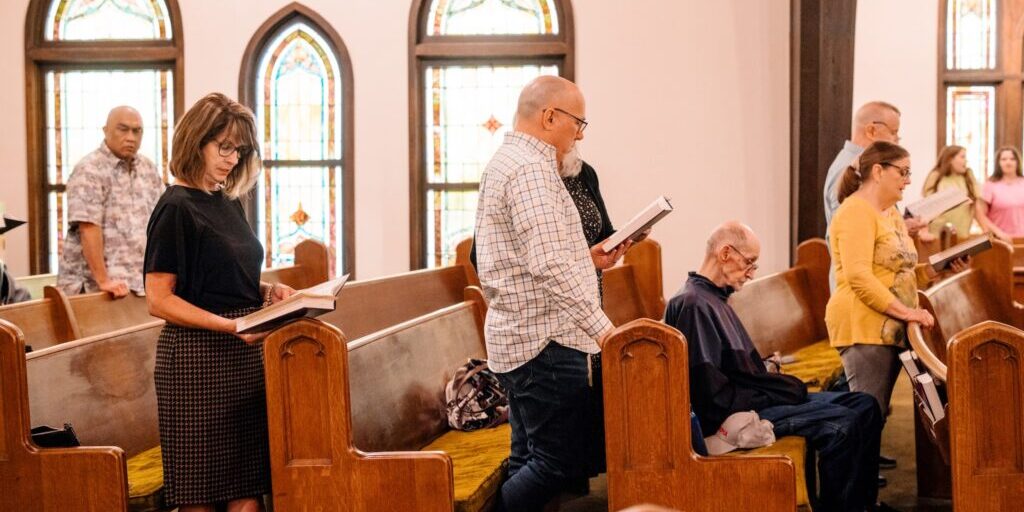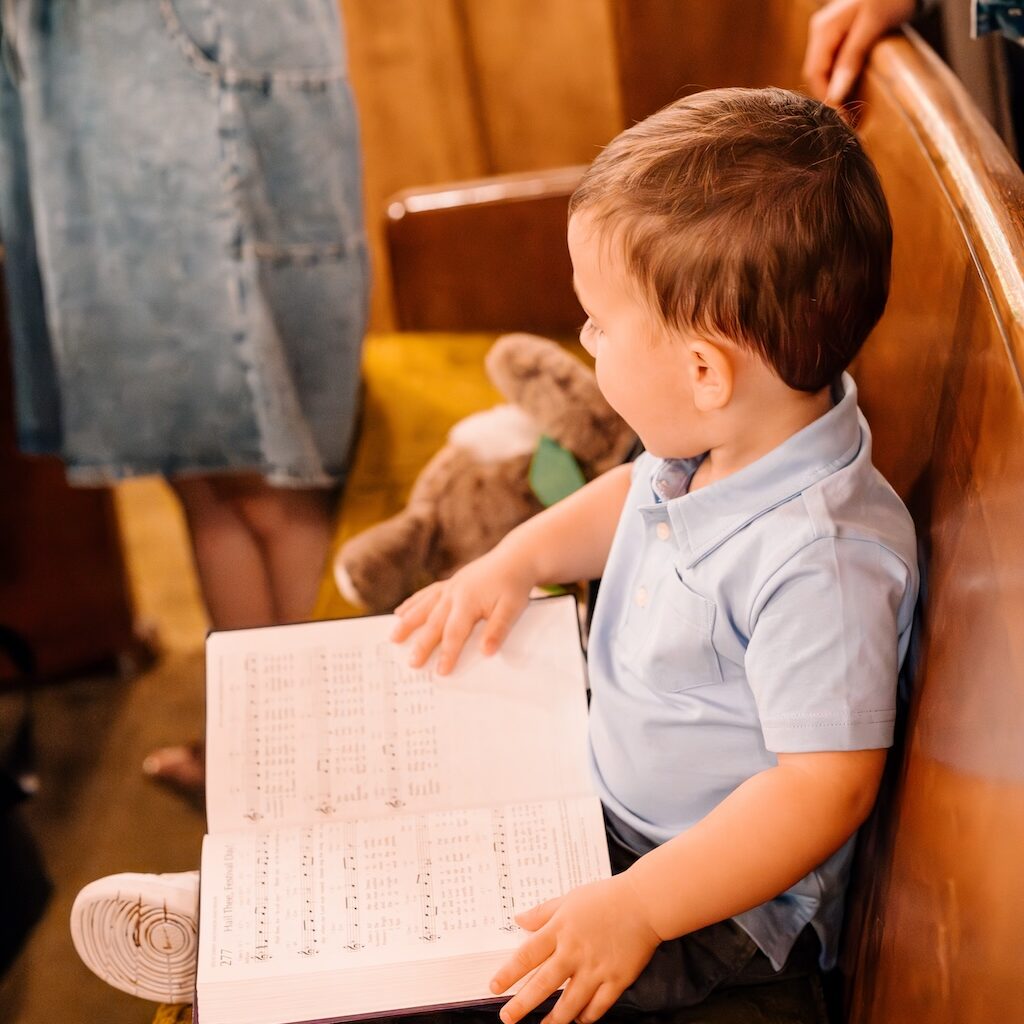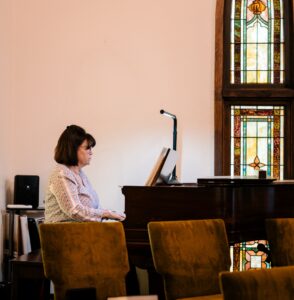Worship is at the heart what we do as the people of God. Each week, as God gathers us in His presence, we hear His Word, we lift our prayers, and we sing His praise. Our worship follows a traditional, liturgical format that draws us into the reality of who God is, and who we are His people. Communion is celebrated on the first Sunday of each month and at other special services throughout the year.
The Lord's Day Service of Divine Worship:
Sundays at 11am
The Service
Our services follow a typical order of Reformed worship. While the words will change from week to week, the order stays fairly uniform. This is because there is an internal flow (or logic, you might say) to Reformed worship. In our worship bulletins, this is captured by a series of headings: God Calls Us Into His Presence; God Convicts, Assures, and Restores Us; God Speaks and Seals His Promises in Word and Sacrament; God Sends Us Forth to Love and Serve. Each heading reminds us that in worship, we are not carrying out an activity independent of, or even for, God, but we are being drawn into God’s own work. As the Psalmist says, we are summoned by God to join all of heaven and earth in singing God’s praise!
Each week, several hymns are sung, Scriptures are read, and a sermon is preached which aims to open up the meaning of the morning’s passage and apply it to our lives as God’s people here and now. Our sermons are approximately 20 minutes long and normally follow a pattern of continuous preaching straight through books of the Bible: each week picking up where we left off the week before.
The service also features a time for communal and personal confession of sins and the hearing of God’s promise of forgiveness and new life in Jesus Christ, the opportunity to make a tithe or offering (which supports the church’s ongoing worship, witness, and work in and beyond our walls), and prayers of intercession for those in need.
Our worship also features the presence of a talented and eager volunteer choir. As well as offering special music each week, the choir assists in leading the congregation in the musical portions of our worship service. For any who are musically inclined, the choir is always looking for new singers!
The Sacraments
We celebrate two sacraments: the Lord’s Supper (Communion) and Baptism. Both sacraments are celebrated during Sunday worship services. Sacraments are God’s work through the Holy Spirit on our behalf, which we receive by faith. They are the visible signs, seals and symbols of God’s invisible, but very real, promises to us.
Baptism is the sacrament of covenantal Christian initiation. In the waters of Baptism, God seals His pledge to be our God, to wash away our sins, and to make us His people. Because God is the actor in our Baptism (God calls, God washes, God blesses), we baptize adults as well as their children. As Presbyterians, we believe that baptism needs only happen once. Therefore, those previously baptized need not be baptized again to be received into membership and participate fully in the life of a Presbyterian church.
We celebrate Communion on the first Sunday of each month, and during special services throughout the year. Communion (also known as the Lord’s Supper or Eucharist) is the sacrament of ongoing, covenantal nurture. As God claims us and seals us in Baptism, drawing us into His covenant and promising to be our God, in Communion He reiterates that promise and strengthens our covenantal bond with Him and with one another. As we come as one to the Table to partake of bread and wine (in our case, juice!), Christ, who is seated in heaven, feeds us spiritually with His body and blood. This is a wonderful mystery, which we receive by faith and which we enjoy rather than attempt to fully comprehend. Those worshiping with us from other denominations are welcome to come to the Table: just as we share one loaf, we share one baptism, one faith, and one Lord (Ephesians 4:5-6). Because Communion is the sacrament of ongoing nurture, it is reserved for baptized believers.
Parents of baptized children are encouraged to speak with their children about the meaning of Christ’s death and sacrifice prior to bringing them to the Table for the first time. It is important for all who come to know that this meal symbolizes the death Christ died for our sins, and the promise that the blessings are ours when we confess our sinfulness and believe. If you would like help in how to talk with your child about Communion, the Pastor is happy to assist!


Dress and Decorum
A level of reverence and focus is appropriate when we come before God in worship. With that said, we invite you to come as you are. Most of our members dress in business casual-type attire, but some of us can still be found in a shirt and tie. Above all, know that we are committed to warmly welcome you just as you are, whoever you are! We do ask that you silence your cell phone out of respect for others, and so that you may worship without distraction.
Except for the hottest parts of the summer, our Pastor will be in a black robe. As with any "uniform," the minister’s robe conveys the authority to carry out a specific task: in this case, preaching and administering the sacraments. The robe also covers as much of the Pastor as possible reminding us that we are not present to receive the minister’s personal thoughts, opinions, or wisdom on a given topic, but the Word of God read and preached, and the sacraments administered.
Children in Worship
We joyfully invite children to be part of our worship services, and we treasure their presence. As equal members of the covenant of God, His promises belong to them as much as they belong to any adult!
We invite children to participate in worship as they are inclined and able, and we encourage parents to embrace worship as a time when they are especially called on by God to nurture and guide their children in learning and embodying faithfulness, and developing the habit of making worship a regular part of their lives. As parents, we often wonder what our children are “getting” from worship, and we worry they will cause a distraction. From a very young age, the words and patterns of worship begin to imprint themselves onto children’s minds even as they seem distracted and uninterested. God works in wondrous ways! So we understand that a few wiggles, or a child asking if the long prayer has finished yet, are all part of how the youngest among us grow up in the faith.
For those moments when parents might find it useful for their little ones, a cry room is available at the rear of the sanctuary.

